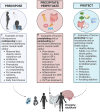Predispose, precipitate, perpetuate, and protect: how diet and the gut influence mental health in emerging adulthood
- PMID: 38505265
- PMCID: PMC10948435
- DOI: 10.3389/fnut.2024.1339269
Predispose, precipitate, perpetuate, and protect: how diet and the gut influence mental health in emerging adulthood
Abstract
Medicine often employs the 4Ps of predisposing, precipitating, perpetuating, and protective factors to identify salient influences on illness states, and to help guide patient care. Mental illness is a significant cause of morbidity and mortality worldwide. Mental health is a complex combination of biological, psychological, environmental, and social factors. There is growing interest in the gut-brain-microbiome (GBM) axis and its impact on mental health. We use the medical model of the 4Ps to explore factors involving the connection between nutrition and the GBM axis and their associated risks with mental health problems in emerging adults (EAs), a life stage when mental illness onset is the most common. We review the impact of current dietary trends on the GBM and on mental health, and the role that gut microbiome-based interventions can have in modulating the GBM axis of EAs. We discuss the implications of gut health on the GBM and areas for clinical intervention.
Keywords: clinical formulation; emerging adult; gut-brain microbiome axis; nutrition; preventive psychiatry; psychiatry.
Copyright © 2024 Warren, O’Connor, Lee, Burton, Walton, Keathley, Wammes and Osuch.
Conflict of interest statement
The authors declare that the research was conducted in the absence of any commercial or financial relationships that could be construed as a potential conflict of interest.
Figures

Similar articles
-
Towards Tailored Gut Microbiome-Based and Dietary Interventions for Promoting the Development and Maintenance of a Healthy Brain.Front Pediatr. 2021 Jul 1;9:705859. doi: 10.3389/fped.2021.705859. eCollection 2021. Front Pediatr. 2021. PMID: 34277527 Free PMC article. Review.
-
Right care, first time: a highly personalised and measurement-based care model to manage youth mental health.Med J Aust. 2019 Nov;211 Suppl 9:S3-S46. doi: 10.5694/mja2.50383. Med J Aust. 2019. PMID: 31679171
-
The Gut Microbiome and Mental Health: Implications for Anxiety- and Trauma-Related Disorders.OMICS. 2018 Feb;22(2):90-107. doi: 10.1089/omi.2017.0077. Epub 2017 Aug 2. OMICS. 2018. PMID: 28767318 Review.
-
The Role of Nutrition and the Gut-Brain Axis in Psychiatry: A Review of the Literature.Neuropsychobiology. 2018 Sep 17:1-9. doi: 10.1159/000492834. Online ahead of print. Neuropsychobiology. 2018. PMID: 30223263 Review.
-
The Role of the Gut Microbiota in Dietary Interventions for Depression and Anxiety.Adv Nutr. 2020 Jul 1;11(4):890-907. doi: 10.1093/advances/nmaa016. Adv Nutr. 2020. PMID: 32149335 Free PMC article. Review.
Cited by
-
Supporting Neurologic Health with Mushroom Nutrition.Nutrients. 2025 May 2;17(9):1568. doi: 10.3390/nu17091568. Nutrients. 2025. PMID: 40362877 Free PMC article. Review.
-
The relationship between night eating behavior, gastrointestinal symptoms, and psychological well-being: insights from a cross-sectional study in Türkiye.J Eat Disord. 2025 Jan 24;13(1):14. doi: 10.1186/s40337-024-01158-x. J Eat Disord. 2025. PMID: 39856759 Free PMC article.
-
Opportunistic infections changed before and after SARS-CoV-2 infection in inflammatory bowel disease patients: a retrospective single-center study in China.Front Med (Lausanne). 2024 Sep 24;11:1461801. doi: 10.3389/fmed.2024.1461801. eCollection 2024. Front Med (Lausanne). 2024. PMID: 39380736 Free PMC article.
-
Nutraceuticals: a promising, yet unregulated Frontier in Healthcare.Eur J Clin Nutr. 2025 May;79(5):413-418. doi: 10.1038/s41430-024-01557-y. Epub 2024 Dec 16. Eur J Clin Nutr. 2025. PMID: 39681616 Review.
References
Publication types
LinkOut - more resources
Full Text Sources

